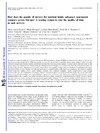Identificador persistente para citar o vincular este elemento:
https://accedacris.ulpgc.es/jspui/handle/10553/44757
| Título: | How does the quality of surveys for nutrient intake adequacy assessment compare across Europe? A scoring system to rate the quality of data in such surveys | Autores/as: | García-Álvarez, Alicia Blanquer, Maria Ribas-Barba, Lourdes Wijnhoven, Trudy M.A. Tabacchi, Garden Gurinovic, Mirjana Serra-Majem, Lluís |
Clasificación UNESCO: | 530204 Estadística económica | Palabras clave: | Nutritional Habits Dietary Patterns Slovenia Euralim Nutrient Intake Adequacy, et al. |
Fecha de publicación: | 2009 | Publicación seriada: | British Journal of Nutrition | Resumen: | Research was conducted within the EURopean micronutrient RECommendations Aligned (EURRECA) Network of Excellence, to find the best practice in assessing nutrient intakes. Objectives include: to search for and use data on individual nutrient intake adequacy (NIA) assessment collected in twenty-eight European countries and the four European Free Trade Association countries: to design and test innovative tools for data quality analysis. The information was obtained using the method described by Blanquer et al. in the present issue. The best-practice criteria were devised to select the most appropriate survey in each country. Then a survey quality scoring system was developed in consultation with experts and tested on these surveys. Weights were allocated according to a variable priority order agreed by consultation. The thirty-two Countries yielded twenty-four national surveys (eight countries excluded). Data collection techniques: eleven countries/surveys used personal interviews only; six used combinations of techniques. Dietary assessment methods: two used repeated 24h recalls only: eleven used combinations. NIA assessment methods: two used probabilistic approach and SD/Z-scores only; eleven used comparison with estimated average requirements/RDA only. Countries were ranked according to the survey quality scoring, but careful interpretation is needed because of incomplete data from some surveys bearing this in mind, the information quality is high in 37.5% countries, medium in 50.0% and low in 12.5%. Although there is room for improvement and caution should be taken when drawing conclusions and recommendations from these results, the lessons learned and tools developed at this first attempt form the basis for future work within the EURRECA framework for aligning European micronutrient recommendations. | URI: | https://accedacris.ulpgc.es/handle/10553/44757 | ISSN: | 0007-1145 | DOI: | 10.1017/S0007114509990584 | Fuente: | British Journal of Nutrition [ISSN 0007-1145], v. 101 (2), p. S51-S63, (Julio 2009) |
| Colección: | Artículos |
Citas SCOPUSTM
11
actualizado el 08-jun-2025
Citas de WEB OF SCIENCETM
Citations
7
actualizado el 18-ene-2026
Visitas
215
actualizado el 15-ene-2026
Descargas
78
actualizado el 15-ene-2026
Google ScholarTM
Verifica
Altmetric
Comparte
Exporta metadatos
Los elementos en ULPGC accedaCRIS están protegidos por derechos de autor con todos los derechos reservados, a menos que se indique lo contrario.
